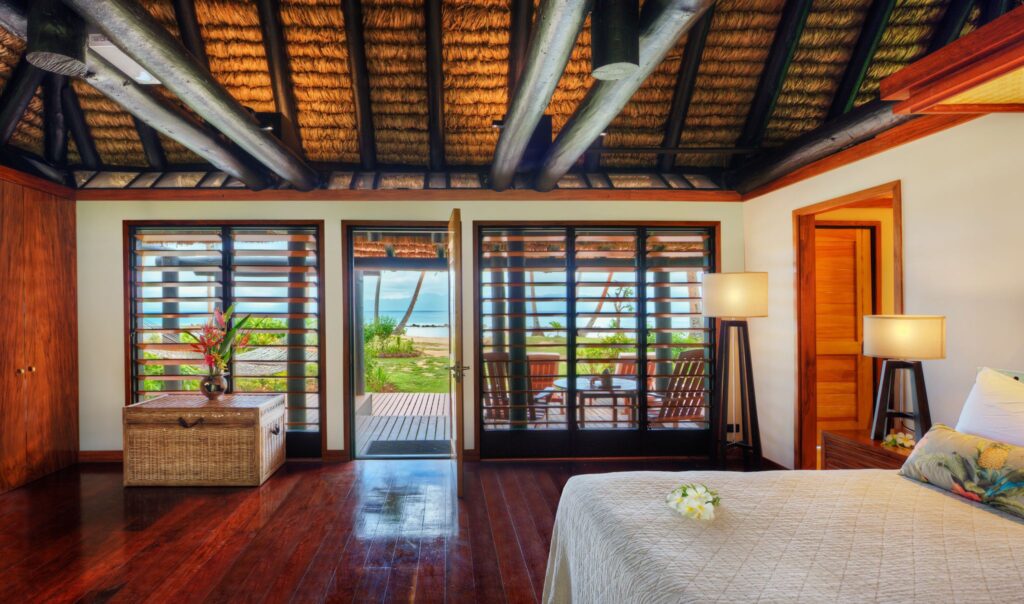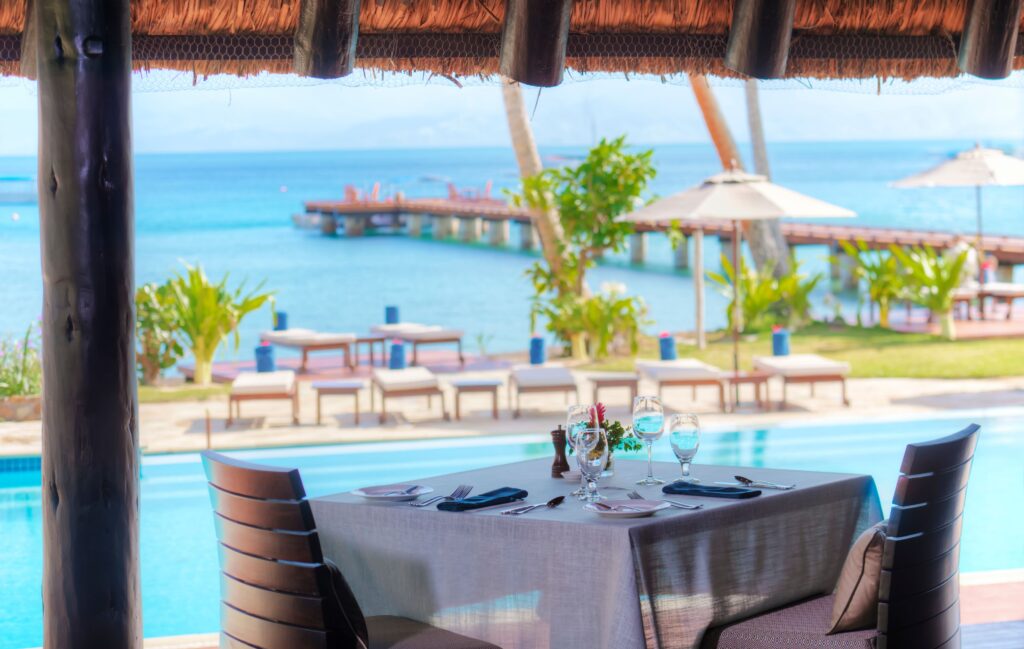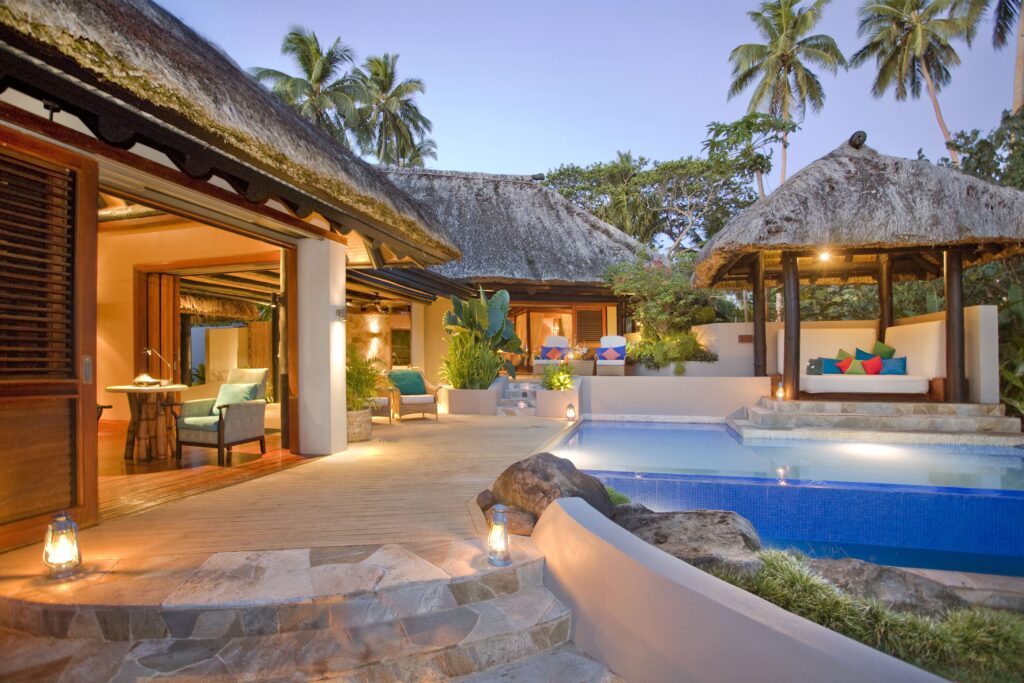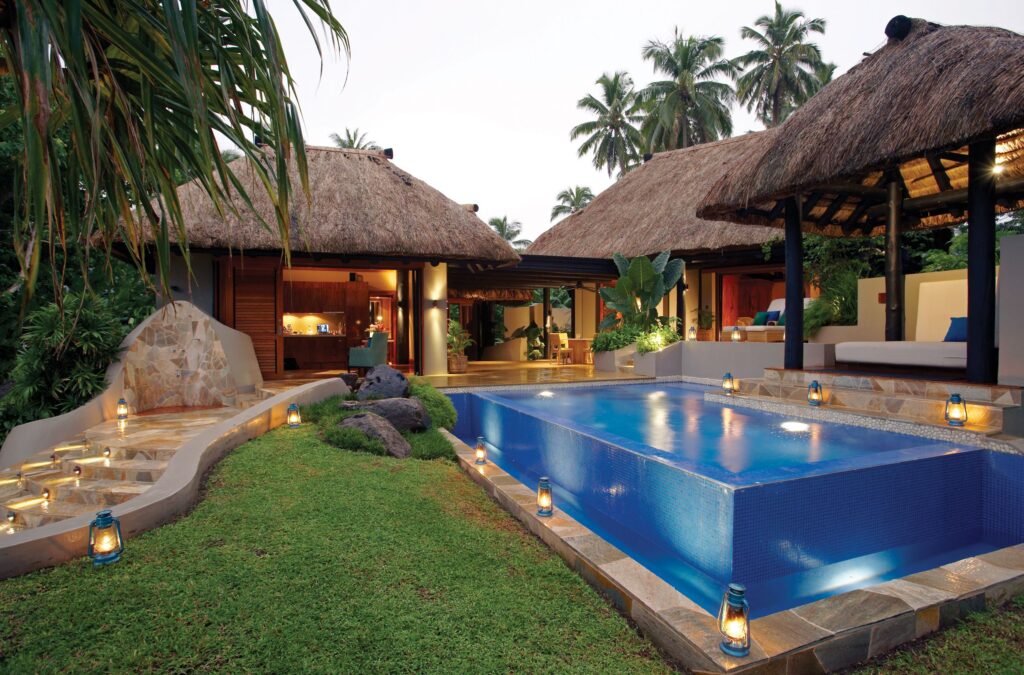
With thousands of years acting as protective stewards of the land, the Fijian people know the importance of wise management of the local natural resources. This is a directive followed daily, not just on Earth Day each year.
With a nod to this legacy of protecting the land and ocean, Jean-Michel Cousteau Resort, Fiji, the premier eco-adventure luxury destination in the South Pacific, is excited to unveil “Soil School” for the resort’s youngest guests. The classes will focus on Soil Regenerative Agriculture that preserves the life in the ground and reverses the effects of past farming and large-scale degradation of the land and its microbiology. This is incredibly important as the Food and Agriculture Organization of the United Nations (FAO) warns that 90 per cent of the Earth’s top soil could be at risk by 2050.
“Fiji is steeped in rich cultural history and natural beauty, and to preserve this for future generations, JMCR proudly uses the Soil Food Web, to educate our guests and employ multiple techniques to regenerate the soil we use to grow food,” said Bartholomew Simpson, general manager of Jean-Michel Cousteau Resort, Fiji. “It is vitally important that we employ best practices to preserve the island’s greatest resources and lessen our impact on the natural environment around us. This is why we are excited to welcome our youngest guests to our newly created ‘Soil School’ where they will learn firsthand Regenerative Agriculture techniques designed to preserve the natural environment for generations to come.”

A sampling of the techniques that young guests will learn and explore at “Soil School” include:
- Ridge to Reef Management: With approximately 10 acres adjacent to the resort used to grow food, the amount of food miles (miles that food travels to consumers) is minimized lessening its impact on the environment.
- Beekeeping: With declining bee populations around the world posing a threat to global food security and nutrition, the resort maintains four hives with the bees stimulating the growing of plants and vegetables in the nearby areas.
- Carbon Storage helps limit the impact of climate change and deforestation. As such, the resort has several hundred trees to negate the harmfulness of excessive carbon: large leaf Mahogany and teak.
- Lactobacillus Serum is cultured and used for organic compost starter, as a faux fertilizer and to make fish hydrolysate.
- Fish Hydrolysate is made from Tilapia fish in the resort ponds.
- Compost is comprised of kitchen scraps, seaweed, chicken manure, thatching, and straw.
- Fungi are inoculated for diversity into the garden beds using foraged specimens.
- Compost Tea is created with aerated molasses and Fish Hydrolysate.
- Biochar improves soil fertility, provides habitat for soil microbes, increases soil moisture and bioavailability of nutrients, and increases plant growth and yield.
- Worm Farms are positioned in garden beds throughout the resort.
- Aquaponics where Tilapia swim easily among herbs and leaves in a coral substrate.
Jean-Michel Cousteau Resort’s philosophy is to strive to maintain nature’s balance by respecting and participating in the living vitality of its environment, just as the Fijian people have flourished for more than 3,000 years by living off the natural bounty that surrounds them. Jean-Michel Cousteau and his team of conservationists believe modern society can learn a lot about achieving a sustainable environment from their agricultural and fishing practices.
Making use of locally sourced resources, the resort relies on the sea to provide fish for dinner, on palms for refreshing coconuts, and on the rain for fresh water. The resort also features an organic garden that is meticulously cared for by the staff. Resort-wide edible vegetation means guests can enjoy tropical fruits including pineapple, mango, papaya, coconut, guava and more, all included in the edible landscaping.

Additionally, the resort is in a protected marine area known as a “Tabu”, and practices recycling and composting, the utilization of low-energy lighting, solar panels on water heaters for some bures, and uses environmentally friendly chemicals in the laundry and kitchen. The timber used for construction comes from certified forests, and the restaurant menu does not include reef fish or farmed prawns.
Some of the initiatives the resort employs to maintain and restore the island’s lush eco-system:
- Keeping in concept with the Savusavu Community Foundation, the resort will help to propagate Teak Tectona grandis, Sandalwood Santalum yasi and Mahogany Swietenia macrophyla trees over the coming years.
- Mangrove Planting Program: The resort has a mangrove planting program that provides an important ecosystem and assists in minimizing coastal erosion.
- Coral reefs: Guests can join the resort’s marine biologist, Johnny Singh and his team in planting coral, an increasingly endangered, crucial species. Coral reefs are essential to protecting the world’s coastlines from the damaging effects of wave action and tropical storms and provide habitats and shelter for many marine organisms.
- Giant clam repopulation: The resort raises juvenile endangered giant clam brood stocks as part of an effort to repopulate the four species in the local waters surrounding the resort. A major focus of the resort’s ecology preservation efforts, the giant clam reserve is a protected area that allows the clams to grow and reproduce using genetically responsible methods.
- Oysters: Jean-Michel Cousteau Resort has partnered with J. Hunter Pearls to farm oysters near the resort in Savusavu Bay. These efforts help to alleviate poverty by providing jobs and mitigate resource extraction. Oysters are an indicator for clean water as each can filter 1,400 liters of water per day, reducing nitrogen and phosphates in the ocean and contributing to the health of the coral reefs.
- Regenerative Organic Garden: The resort maintains an organic garden that provides more than 20 percent of the fruits, vegetables and herbs served on property, reducing the amount of food that needs to be transported to the resort and to the island. The diversification of the landscaping – with native flowering, edible and medicinal plants – aids in the removal of carbon dioxide, thus regulating its level and minimizing global warming that can contribute to coral bleaching.
- Replanting of a critically endangered Hibiscus, named h. bennettii after ethnobotanist John Bennett, which is endemic only to the island of Vanua Levu.
Jean-Michel Cousteau Resort embodies a luxurious laid-back vibe, with a nod to the rich Fijian cultural history, and some of the world’s most pristine and biodiverse underwater adventures. Nestled in an exclusive, lush tropical enclave on the island of Vanua Levu overlooking the tranquil waters of Savusavu Bay, the resort is a one-of-a-kind escape for couples, families, and discerning travelers seeking relaxation, adventures, and a luxury recharge.

Prospective U.S. guests can book reservations by calling (800) 246-3454 or emailing info@fijiresort.com.
About Jean-Michel Cousteau Resort
The award-winning Jean-Michel Cousteau Resort is one of the most renowned vacation destinations in the South Pacific. Located on the island of Vanua Levu and built on 17 acres of land, the luxury resort overlooks the peaceful waters of Savusavu Bay and offers an exclusive escape for couples, families, and discerning travelers looking for experiential travel coupled with authentic luxury and local culture. Jean-Michel Cousteau Resort offers an unforgettable vacation experience that is derived from the natural beauty of the island, personalized attention, and the warmth of the staff. The environmentally and socially responsible resort offers guests a wide variety of amenities, including specially designed individual thatched-roof bures, world-class dining, an outstanding lineup of recreational activities, unmatched ecological experiences, and an array of Fijian-inspired spa treatments. www.fijiresort.com.
About Canyon Equity LLC.
The Canyon Group of Companies, who own the resort, headquartered in Larkspur, California, was founded in May 2005. Its mantra is to acquire and develop small ultra-luxury branded resorts in unique destinations with small residential components creating an eclectic yet highly compatible sense of community in each destination. Since its formation in 2005 Canyon has created an impressive portfolio of resorts, in locations ranging from the turquoise waters of Fiji to the towering peaks of Yellowstone, to the artist colonies of Santa Fe, and in the Canyons of southern Utah.
The Canyon Group’s portfolio comprises such iconic properties as Amangiri (Utah), Amangani (Jackson, Wyoming), Four Seasons Resort Rancho Encantado (Santa Fe, New Mexico), Jean-Michel Cousteau Resort (Fiji), and Dunton Hot Springs, (Dunton, Colorado). Some new stunning developments are also underway in such locations as the Papagayo Peninsula, Costa Rica, and a 400-year-old Hacienda in Mexico, all destined to make grand statements in the niche market of ultra-luxury international travel as each one is launched. www.canyonequity.com


Comments are closed.